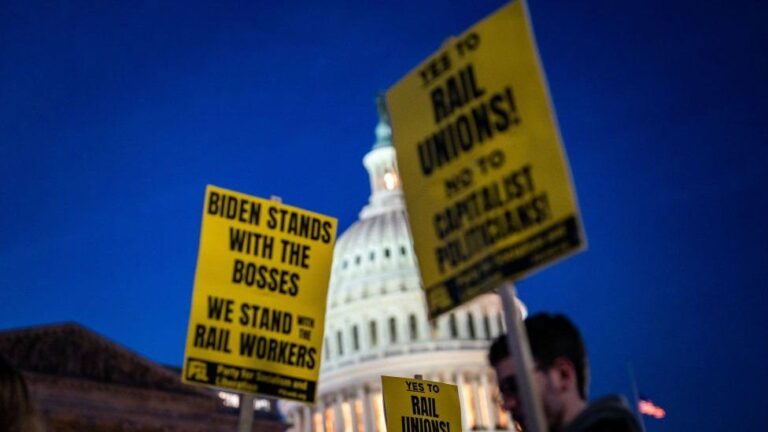The US Senate has overwhelmingly approved a measure to block a strike by railway workers that could have a devastating impact on the US economy.
In an 80 to 15 vote, the Senate passed a bill that imposes a contract deal on a dozen unions representing railway workers.
It was passed in an expedited vote as US President Joe Biden urged lawmakeres to act quickly to avoid a strike.
An amendment to add paid sick leave for workers, however, failed to pass.
The bill was tabled in Congress after Mr Biden cautioned that a strike by railway workers could have a significant economic impact that would “hurt millions of other working people and families”.
The measure now heads to the president’s desk. Once the bill becomes law, any strike action would be considered illegal.
In a statement, Mr Biden praised Congress passing the bill, saying lawmakers have “spared this country a Christmas catastrophe”.
Business organisations have said that a strike would disrupt the flow of fuel, medicine, and other vital goods, with an estimated financial hit of $2bn (£1.67bn) per day.
It would also disrupt commuter rail services for up to seven million travellers per day.
Without action from Congress, the rail worker labour stoppage would have happened as soon as 9 December.
The Senate’s vote on Thursday was expedited, with lawmakers agreeing to hold three votes back-to-back on the issue – one on the bill and two on proposed amendments. Usually, the upper chamber takes days of procedural votes to pass a bill.
The measure passed on Thursday, one day after it was approved by the House of Representatives, imposes a previous agreement with railway workers’ unions that include 24% raises and $5,000 in bonuses stretched over a series of annual payments.
Employees are also expected to pay a larger portion of their health insurance costs, but premiums would be capped at 15%.
The deal, brokered in September by the Biden administration, was rejected by four of the 12 labour unions involved in negotiations over its lack of paid sick leave.
Senator Bernie Sanders proposed an amendment to the bill that would add seven paid sick days for rail workers, but it was struck down in a Senate vote of 52 to 43, as it needed a minimum of 60 votes to pass.
Another amendment by Senator Dan Sullivan of Alaska proposed extending negotiations between unions and rail operators for 60 days past the deadline of 8 December, but that also failed on a 26-69 vote.
The US House of Representatives passed a separate paid sick leave bill for railway workers on Wednesday, but the Senate has yet to vote on it.
The bill would guarantee workers seven days of paid sick leave each year. It has received opposition from some Republican lawmakers and the US Chamber of Commerce, who said a sick leave law “would impose an unworkable, one-sided modification to a labour agreement”.
Paid sick leave became a contentious issue during prior negotiations, with the unions – which had previously expressed a preference for higher wages and strong disability benefits over sick days – arguing that the immensely profitable railroad companies could afford them with minimal impact.
The president of the International Brotherhood of Teamsters criticised Thursday’s Senate vote on sick leave in a post on Twitter.
“Rail carriers make record profits. Rail workers get zero paid sick days. Is this OK? Paid sick leave is a basic human right,” wrote Sean O’Brien.



























